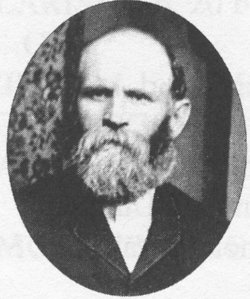Branching out to a One-Name Study
#12ancestors blog challenge means selecting one of the weekly themes for the monthly blog post. For February 2022, the theme that called out to me is "branching out". Moving from your direct family lines to a project encompassing all of a surname is a very big leap in branching out. This is essentially how I ended up with the beginnings of a one-name study for Messervy/Messervey. I have previously mentioned how I was attracted to my maternal grandmother's Messerveys both for my own direct line genealogy and the history, chronological and social, that brought the Messervey name to life.
Delving into the Newfoundland history and discovering the Jersey presence going back to the late 1600s and early 1700s was enticing. A bonus to the Newfoundland story was the discovery that the Messerveys, for the most part, settled in St George's Bay in the community of Sandy Point. And adding to the story is that Sandy Point no longer exists as an inhabited community, with the last residents having left in the 1970s. What a perfect setting for a one-place study, which I had considered, but reality came to tell me it was perhaps branching out to more than I could manage.
Eventually I discovered the Guild of One-Name Studies and after a number of months of thinking about it, took the plunge and joined. I also registered Messervey[1] as my surname of study. One name or surname studies present an entire new world. It isn't for everyone but does comprise a fairly wide range of perspectives. For some, name collecting is the goal, that is, acquiring the names and basic data on every person with that surname. For others, like me, the goal is still acquiring as many people as possible in as many parts of the world where the name exists, but from the beginning putting them in families, finding more about their lives, writing up stories about those where you locate information. I began with Nova Scotia Canada as my own line, followed it to Newfoundland and then to Jersey in the Channel Islands. I then expanded to New Zealand and Australia, and to the United States. These studies are never completed - some are very large with 100,000 individuals, while others can be unique surnames with less than a few hundred instances. Some are managed by one researcher while the larger ones usually require a team.
Messervey is unique in its Jersey, CI origins among the studies at the Guild. I believe there is one other with CI origins but it is not active. Another huge advantage for me has been the Guild website program. Through its own servers, the Guild maintains the option for members to have a version of a TNG[2] website for your one-name study. While anyone can conduct a one-name study independently, an organization such as the Guild is a source of ideas, structure, methodology, education, networking with others. There is also a smaller organization, called the Surname Society, which provides education, support and networking with others. Google searching can result in finding independent projects on their own websites.
Throughout the time I have dabbled or been immersed in the Messervey study, I have often stumbled to explain the attraction. I have presented to genealogy societies where the audience was very interested but stopped at wanting to do their own one-name study. It seems overwhelming and of course, if surnames in your lines fall into the Smith, Jones, Brown or MacDonald variety, it might truly be overwhelming for one person. Personally, admitting some bias, I believe the Messerveys are perfect for the one-name study genre: the numbers categorize it as a medium size study; the years from 1309 on Jersey mean it is contained; the chronology of the Messervey lines follow important trends in history and in social history; the patterns of emigration are quite straightforward. While the early emigration of a couple of Messervys to the east coast of the United States, and generations of larger families does present a numbers challenge for the American lines, some work has already been done and can be verified for the study. The US also contains the bulk of variant spellings, which can be both interesting and markers for following specific lines.
Take a look at the Guild and you will see a surname search at the upper righthand of the website: if you input Messervey it will take you to my profile page, but try other surnames in your line to see if there is a member studying your surname! If you think you have a surname that is not too large and may provide some interesting context, consider your own one-name study.
[1] Please note that in my early stage of study, I was primarily familiar with the Messervey spelling variant as this was the case in eastern Canada. When I became aware that in Jersey, the modern standardised spelling was Messervy, I did attempt to change my registered study spelling with the Guild, but their data system could not manage this at the time. It is not significant in the world of surnames: anyone familiar with genealogy research is aware that the further one goes back, the more variants can be found, especially in surnames with non-English speaking origins. Remember that Messervy is of Norman origin and its early written form reflected this origin "mal servi".
[2] The Next Generation of Genealogy Site-Building (https://tngsitebuilding.com) is a web-based genealogy program offering site by template to more customised versions. The Guild will keep your one-name website for legacy reasons as long as the Guild exists.





Thank you for writing about joining the Guild. It's something I've always thought about doing - that and One Place studies. I think both would be enormously useful for building a picture of families/places and stories. It sounds like you have made great progress with your family history as a result. Always so much to do.
ReplyDelete